Frequently Asked Questions
What is Freediving Gold Coast’s cancellation policy?
Cancellations on freediving courses within 72 hours (3 days) of the start date are non-refundable (100% loss of funds). We will charge a 100% per person cancellation fee. To run a smooth and professional dive operation for our freedivers is a costly venture that requires careful planning and coordination of commercial skippers / deckhands, freediving instructors, pool lane hire, and administrators. Cancellations within 72 hours can be very costly for us due to financial & time commitments we make in order to run a course for students. Hence our cancellation policy applies.
Cancellations on confirmed bookings more then 72 hours (3 days) from dive date/time are 100% refundable.
All cancellations more than 72 hours start from dive date/time must be received by telephone or email. An administration fee of $35 will be charged. This is because you receive your info. pack with learning materials within 24hrs of your booking. Contact us between 8.30 am and 4:30 pm Monday to Thursday by phone or send an email requesting the cancellation to dive@freedivinggoldcoast.com.au. Please include full name under which the reservation was made, email address, the date and name of package, the amount of the transaction, and a telephone number where you can be reached (if necessary).
If a course or component of a course (e.g., an ocean day) is cancelled or postponed by us we will arrange a number of alternative dates or options for you to complete your course.
Cancellations due to COVID lockdowns can occur. In these instances where a course is not rescheduled but cancelled by the client an administration fee of $35 will be charged. This is because you have already received your info. pack with learning materials within 24hrs of your booking.
I want to make a last minute booking for the boat. Can I do this?
Unfortunately, no. Bookings close 4:30pm the day prior to the dive. We finalise all bookings then to begin preparing gear and packing the boat. We are then up very early on dive morning preparing for the next day’s diving.
What is the minimum age for freediving courses?
Minimum age to be registered on a freediving course is 16 years. If you are between 16 to 18 years you must have parental or legal guardian consent to participate in a course. For Assistant Instructor and Instructor courses you must be 18 years or older.
In the near future, If you are 12 to 16 years old it will be possible to participate in a course which teaches skills later required in the sport of freediving with a focus on age appropriate safety and age appropriate skill development. The AIDA Youth Courses for children ages 6 -11 are ‘beyond snorkeling’ courses but are not freediving courses. These courses teach a skill set and appreciation for the underwater environment, so they can become aware of how they can move, behave and be safe while exploring the under the water (while adequately supervised). At no stage do these courses teach, or encourage maximum breath holds / maximal distances or promote a competitive attitude towards being underwater.
What equipment do I need for a freediving course?
You will need the following dive equipment on a freediving course:
- Mask
- Snorkel
- Weight belt and weights
- Fins
- Wetsuit
For our Intro Freediver or Ocean Freediver course you may use either scuba style or freediving equipment. For more advanced courses you must use spedific freediving equipment.
You are welcome to bring your own dive equipment or Freediving Gold Coast have for rental, prior to dive and course days, masks, wetsuits, vest, hoods and long freediving fins. Weight belts, weights, and snorkels are provided for complimentary use during all freediving courses mainly because our specific freediving equipment is more suitable to meet pool regulations (no hard weights are allowed in the pool). Flexible scuba diving snorkels also do not work well in freediving.
You must advise us 24 hrs prior to the day of your course if you require freediving equipment as we do not carry extra fins/wetsuits/etc. on the boat that haven’t been pre-booked – we simply don’t have the storage room. You will need to specify your size 24 hours prior to your course as our stock numbers are limited.
Long Freediving Fins Rental
The size of the fins we rent are as follows:
Fin sizes:
- Size 37 to 38 (about US 3 to 4)
- Size 39 to 40 (about US 5 to 6)
- Size 41 to 42 (about US 7 to 8)
- Size 43 to 44 (about US 9 to 10)
- Size 45 to 46 (about US 11 to 12)
- Size 47 to 48 (about US 13 to 14)
If you have smaller feet than the 37-38 size then please bring a pair of sport socks to help hold them on. Also we have limited numbers of fins and if everybody has the same sized feet you could miss out so please book fin sizes prior to your freediving course.
Wetsuit Rental
YOU MUST HAVE A WETSUIT ON ALL OUR COURSES: MINIMUM 5mm scuba suit for ocean days/courses. Steamers or 2/3mm wetsuits are suitable for pool components only.
Freediving Gold Coast rent high quality 2 piece and one piece 5mm wetsuits for ocean courses & 2/3mm wetsuits for pool courses. Our goal is to keep you toasty warm so we include complimentary Probe Idry 5mm hoods or 3mm hooded vests in the rental of all 5mm ocean wetsuits.
Size Guides for Men and Ladies are as follows:
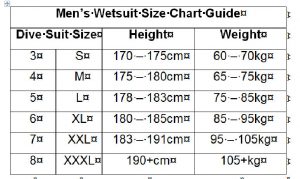
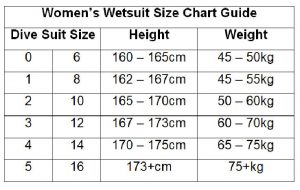
If you bring your own wetsuit, please note the following:
- The Gold Coast Aquatic Centre & Nerang Aquatic Centre is heated to about 28 degrees centigrade so a 2/3mm steamer wetsuit is fine for the pool.
- For all ocean courses you MUST wear a 5mm scuba diving wetsuit or a 3mm freediving wetsuit (if open cell). A 3mm steamer or scuba diving wetsuit is not suitable for the ocean. You will be very cold and it will make it very hard for you to relax on your course. Do not accept sale of a 3mm steamer / wetsuit for ocean Courses as these are completely unsuitable for freediving and you will be very disappointed. Salespeople may suggest that they are suitable for snorkelling and that a 3mm will be fine – You are not snorkelling – you are freediving and freediving is a very different recreational activity to snorkelling and spearfishing – so avoid 3mm steamers!
- A 3mm freediving suit in “open cell” wetsuit will be fine for 9 months of the year but in the middle of winter when water temperatures drop to possibly 18 degrees centigrade we strongly recommend a suitable vest underneath. A 5 mm ‘open cell’ freediving wetsuit is best – especially for those who feel the cold in winter.
What else do I need to bring?
Freediving Gold Coast also recommend bringing:
- Water bottle to remain hydrated (especially as breath holding leads to more urination!)
- Hat
- Factor 30 Sun Protection lotion.
- Travel Calm Seasickness tablets (original) or equivalent taken before going out on all Open Water courses. If you get seasick we will not be able to return to land until all diving is completed.
- Some snack food/light lunch. We recommend that you have a good breakfast but light food during the day. Again big meals interfere with breath holds. We will be providing tea and coffee with biscuits on all Open Water and Wavebreak Island courses.
Please note that space is very limited on the boat. Please change into your wetsuit before getting onto the boat and leave all clothes, towels and bulky bags onshore.
Policy on Lost or Damaged Rental equipment
Rental equipement lost or damaged on the course is charged as follows:
- Dive belt $35
- Dive weights $12 per weight.
- Mask $50
- Snorkel $15.
- Snorkel float $10
Boat Meeting Pick-Up Point
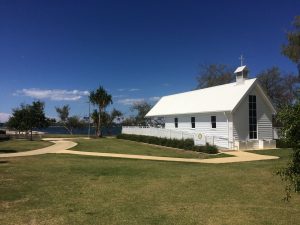
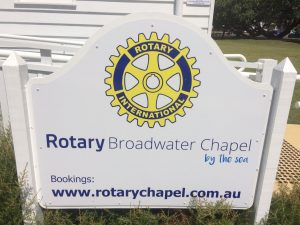
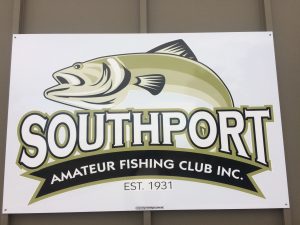

Unless otherwise stated, all freediving courses for Ocean/Open Water freediving courses will require pick up by our boat (this is included in any course costs). The pick up point is behind the Southport Amateur Fishing Club, Marine Parade, Southport 4215 QLD – at the water’s edge. Check out this video to see the Boat Departure Point. There are toilets and cold showers here for your access. This meeting area is less than 10 minutes walk or 600 metres north of the Gold Coast Aquatic Centre in the area directly behind the Rotary Broadwater Chapel and the Southport Amateur Fishing Club at the water’s edge. This is slightly north of Southport Fishing and Dive where cold drinks can be purchased. A Google Map search will easily find these places. There is a little cove here for access to and from the boat. We meet at the conveniently placed covered picnic table (see above picture).
There is plenty of free parking to the left (or north) of the Southport Amateur Fishing Club in Mitchell Park. Do not park in bays designated for boat trailers as you can be fined by Council. Alternatively, the closest light rail station is the Davenport St Station which is also conveniently located close to the bus network. Your confirmation letter when you pay for a course will also confirm the boat pick up point. Finally, space is limited on the boat and we encourage you to leave all unnecessary baggage in your car. If you don’t have a place to store your belongings we will be able to store surplus gear in our car.
Can I scuba dive before I freedive?
Due to medical restrictions, you must not scuba dive 24 hours prior to freediving. The reasons for this will be explained in our courses.
Should I eat before I freedive?
Generally, we only encourage light foods before and during the practical part of our freediving courses as food will interfere with breath holding capacity and diving. Heavy breakfasts can also make some feel queasy on the boat. Bananas, watermelon, and muesli bars are probably best. On the morning of a dive course we recommend a light breakfast before diving/going out in the boat – we do not encourage skipping of meals.
Generally do NOT drink coffee / caffeine on the morning of a dive course (it elevates your heart rate). Contrary to popular belief, there is no statistically significant research that has proved that milk or dairy products contributes to sinus congestion and can interfere with equalisation though to play it safe for equalisation you might like to reduce dairy food consumption prior to a dive course.
Is my diving course internationally recognised?
Yes, your course is recognised by AIDA (International Association for the Development of Apnea), the world’s biggest pure freediving organisation. An independent evaluation of freediving organisations in 2013 by Deeper Blue found that AIDA International was the “clear leader” because they have had an education program in place since 1999. For more information on the results of this survey click here.
Freediving Gold Coast realise that more and more people are doing freedive courses and, as such, we recognise prior learning (RPL) from other internationally recognised freediving organisations only (such as are SSI and PADI) and we can assess your freedive abilities and develop a cross over freediving program (see section below for more details) for you. Please don’t hesitate to contact us about course equivalencies and crossover freediving training programs.
Once you successfully complete a freediving course with Freediving Gold Coast you will be registered on the AIDA website database which records your education history. Being registered allows you to undertake more advanced courses and with any other AIDA instructors anywhere in the world.
Can I do an advanced AIDA freediving course if my certification is with another freediving organisation?
Yes, you can. All students who have been certified from another freediving organisation will need to undergo an AIDA Crossover Evaluation to ensure they meet the AIDA prerequisites for the higher level AIDA course they want to complete. This involves:
- Assessment of the level of knowledge of the student by means of passing a written exam at 75% of the AIDA course level equivalent to their certification level in their oganisation. Allow 2 hours for this assessment.
- Assessment of the pool or confined water skills in the AIDA course equivalent to the student’s certification level in their organisation. Allow 2 hours for this assessment.
- Assessment of all ocean or open water skills n the AIDA course equivalent to the student’s certification level in their organisation. This is typically one morning of about 4 hours including the boat trip to and from the dive site.
Freediving Gold Coast charges $320 for this Crossover Evaluation which includes all boat fees and the certification fee.
For example, if the student is wishing to undertake the AIDA 3 Advanced Freediver certification, and has a PADI Freediver certifcation, then the student will book for the AIDA 3 Advanced Freediver course. The student will then need to pass the AIDA 2 Freediver exam, and complete the AIDA 2 skills in the pool. Finally, the PADI Freediver will need to go out on a Deep Dive Day so they can be assessed to ensure their ocean/open water skills are equivalent to the AIDA 2 Freediver certification.
What happens if I do not pass a component of my freediving course?
It is possible to repeat all components of any course at a later date as follows:
- If you do not pass the exam at 75% or higher it is possible to resit the exam at a later date. Cost is $95.
- If you do not pass the pool component (such as the static breathhold) another time at the pool can be arranged for $95.
- If you do not complete the depth criteria or cannot equalise it is possible to book another Deep Dive Day for $95 (all dates indicated on the website).
I was sent the course manuals in my introductory email. Do I need to study these before the course?
The answer is: Nope. You don’t need to study your notes prior to attending your Ocean Freediver Course or the Advanced Freediver Courses. We go through the manuals with you in detail during your theory sessions. We send these through as a courtesy for those who are keen to get stuck-in. Please note, these manuals are not a substitute for tuition from an AIDA International Freediving Instructor and we do not encourage the practice of freediving until you have instruction from an internationally recognised freediving agency which will provide you with the most current in efficient and safest practices for the sport of freediving.
Can I take my own camera with me when I freedive?
Yes, you are welcome to bring your own underwater camera and we will try to take pictures or videos of you diving, where possible. We also take pictures and video and upload some material to Freediving Gold Coast Facebook and for use in other marketing material. Prior to the course you will be asked if you are happy to be included in these pictures. We do not provide photos or videos after the course to individual students because of the time and difficulties involved in uploading large files.
What’s not included in my course?
Freediving Gold Coast does not pay entry fees to public pools for freediving courses – you will need to pay these separately when you arrive at the pool. We do pay for the hire of lanes in different pools. Remember – wetsuits are not included or provided as part of your course (see above).
Freediving Gold Coast does not pay for transit or taxi costs to and from the dive collection point during freediving courses. Often, students car pool with each other once they have met on a course.
Freediving Gold Coast certifies all successful students completing a course on the AIDA website but cannot order a certification card for you. AIDA prefers the electronic copies of cards as the ecological alternative to plastic cards.
Freediving Gold Coast does not arrange accommodation during your stay on the Gold Coast for the duration of your freediving courses.
Where can I stay on the Gold Coast?
We recommend finding accommodation around Southport as the Gold Coast Aquatic Centre is located here for all our pool based components and the meeting point for all boat departures for the ocean component of our courses. Our office, Parkside Medical, is also located only some 10 minutes away by car. We have also prepared the following list which we hope is helpful and gives you some ideas where to stay while doing your freediving course with Freediving Gold Coast.
ACCOMMODATION OPTIONS AROUND SOUTHPORT ON THE GOLD COAST
Changes in Course/Event Details
We endevour to keep all details on the website regarding events, courses, dates, times and the Calendar up to date and accurate so you know what is happening and what to expect. However, we sometimes make changes to venues (such as the pool) due to unforeseen events (e.g., school swimming carnivals) and ocean dive days (typically due to the weather). Any such changes will be communicated to you at the beginning of your course. Such changes in event details communicated during a course take precedence over the website details.
